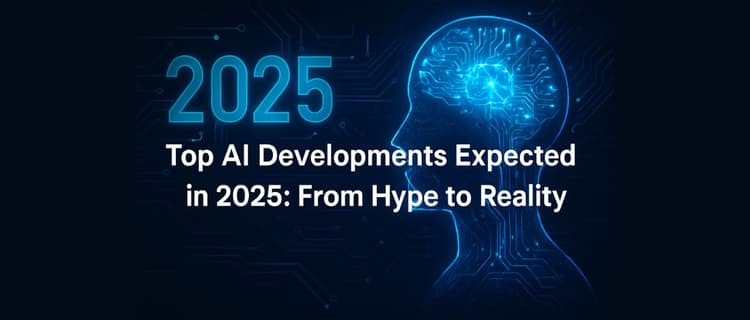Over the past ten years, artificial intelligence (AI) has continuously made headlines and captivated people's attention. Consider virtual assistants, facial recognition, recommendation algorithms, and AI-generated art, things that were once thought of as futuristic but are now commonplace in our daily lives. But by 2025, AI is expected to transcend from a trendy term to a deeply ingrained reality in many different industries. This year is likely to see some revolutionary advancements in AI due to the quick speed of research, commercial adoption, and ethical discussion.
These are the most significant AI advancements anticipated in 2025, signalling the transition from hype to real-world effects.
1. Content Created by AI Will Become Commonplace
Although AI-generated text, images, videos, and even music are not new, they will be widely used in marketing, journalism, gaming, entertainment, and education by 2025. Businesses are already automating blogs, scripts, and social content with models like GPT-4.5 and their upcoming successors. Anticipate a boom in artificial intelligence (AI) tools in 2025 that can produce dynamic story-based content or highly customised video advertisements. Hollywood is also investigating AI for pre-production and scripting.
What's altered? From help to complete automation with human supervision, content creation is evolving.
2. Autonomous Workflows and AI Agents
The goal of autonomous AI agents is to complete tasks with little assistance from humans. By 2025, these agents will be able to manage entire workflows, including basic research, email management, meeting scheduling, and travel booking. AI customer service representatives, for instance, can handle complaints, provide refunds, and even upsell in addition to answering questions.
Additionally, multi-agent ecosystems groups of AIs cooperating similarly to human teams will start to appear.
3. AI and Robotics: Machines that are smarter and can move
By 2025, it is anticipated that AI-powered robotics will have advanced significantly. Consider advanced medical assistants, home robots, drone deliveries, and automated warehouses. More precise object detection, motion planning, and natural language interfaces will enable robots to more reliably carry out tasks like stocking shelves, folding laundry, and helping the elderly.
AI-driven robots, which combine machine learning with practical adaptability, will also be crucial in disaster relief, defence, and agriculture.
4. AI in Healthcare: From Drug Discovery to Diagnosis
Although the potential of AI in healthcare has long been discussed, it will materialise in 2025. Improved diagnostic models will help physicians more accurately diagnose illnesses from scans, pictures, and medical records. Predictive analytics, which identifies health risks before symptoms manifest, will also be powered by AI.
AI will also significantly shorten the time needed for drug discovery. Models can propose possible compounds in days rather than years by evaluating biological data and performing simulations. In 2025, anticipate more personalised medicine and clinical trials aided by AI.
5. Ethics and Regulation of AI: From Discussion to Structure
Great power carries a great deal of responsibility. Deepfakes, bias, surveillance, disinformation, and job displacement are some of the issues raised by the development of AI. Governments and international organisations will enforce more stringent AI governance in 2025, calling for safety, equity, and transparency.
U.S. executive orders, industry-wide self-regulations, and the EU AI Act are only the first steps. Particularly in industries like banking, hiring, and healthcare, ethical AI will become required rather than optional.
6. Edge AI: More Intelligent Devices, Reduced Reliance on the Cloud
Running AI algorithms locally on devices as opposed to depending on the cloud is known as edge AI. This translates into lower expenses, improved privacy, and quicker reaction times. Anticipate cutting-edge AI in wearables, smart cameras, driverless cars, and even home appliances by 2025.
Chip innovations like Apple's Neural Engine and Google's Edge TPU will make commonplace gadgets smarter and able to adjust in real time without requiring constant internet access.
7. AI in Education: Tailored and Expandable Education
By 2025, personalised learning, adaptive testing, and AI tutors will all be commonplace. In order to provide individualised content, these tools will evaluate each student's performance, pace, and style. AI will be used more and more by educational institutions and ed-tech businesses to close learning gaps and lower dropout rates.
Additionally, AI will help teachers with administrative duties like planning, grading, and managing, allowing them to concentrate more on student engagement.
Conclusion
AI is expected to cross significant thresholds in 2025, moving from specialised use cases to widespread systemic adoption. AI will no longer be a far-off future; it will be a part of everyday operations, choices, and life itself, whether it takes the form of intelligent machines, innovative tools, or ethical discussions. As we enter this new era, the emphasis must be on utilising AI for inclusive and responsible innovation.
For updates and additional information, follow on social media platforms.
Social Media: LinkedIn, Instagram, Facebook, Pinterest.
